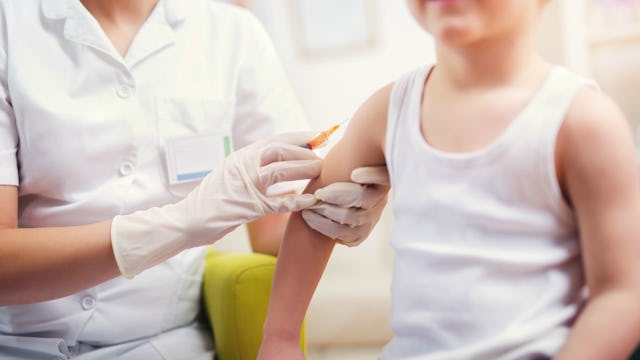Stop Using Autism As An Excuse Not To Vaccinate, And Here's Why

Like a lot of people, I spend too much time on social media. For my own sanity, I try to minimize commenting on political posts because it feels unproductive at best, and at worst, I leave the conversation lamenting the fact that such a large proportion of Facebook users believe anything with a byline is a legitimate source of information.
Although I never bought into the idea that vaccines somehow contributed to the seemingly growing autism rate among children, it wasn’t until my own daughter was diagnosed with autism spectrum disorder (ASD) shortly before her 3rd birthday that these kinds of discussions began to take on a new meaning for our family.
One would think after Andrew Wakefield, the gastroenterologist who pioneered the causal link between vaccines and autism, lost his license to practice in the UK that it would end, but there are always people coming out of the woodwork parading a pseudoscientific article brandishing another supposed link between vaccines and autism. The anti-vaccine movement has become more than just an annoyance because one of its largest tenets continues to be that vaccines cause autism.
As an autism advocate, I would be remiss to keep silent while this kind of rhetoric is still being used. Please be very careful when you use autism as an excuse not to vaccinate — or better yet, don’t suggest it at all. For someone like myself with a child on the spectrum, you’re not just saying that vaccines cause autism. What you’re really saying is that you would rather risk your child dying from a preventable disease than have them be like my child. And that is really unfortunate because my daughter is amazing, and what’s more important, she’s healthy in part because she’s been fully vaccinated.
Even if I found out tomorrow that vaccines somehow cause autism (they don’t), I would have no regrets. For someone on the spectrum, autism does not define them, but it is so integrated into who they are that there is no one point in which their autism ends and they begin. I can no sooner extricate the autistic parts of my daughter than I can the parts that gave her blue eyes and a towhead, the parts that make her open-mouth giggle when she’s laughing at my funny faces or the singularly stubborn parts that fuel her obsession with Legos and YouTube videos, nor would I want to.
The problem with attributing an increase in autism rates to vaccines is that it fails to take into account that a large part of the supposed rise in rates can also be accounted for at least in part by the fact that diagnostics have changed in the last few years. ASD is listed under the DSM-V combining what used to be autism, Asperger syndrome, and pervasive development disorder (PDD). The rates have also been impacted by the fact that autism awareness has increased and the stigma surrounding ASD has diminished, making parents more likely to seek a diagnosis.
More importantly, clinging to a link between vaccines and autism is detrimental to the way we talk about ASD and the progress we’ve made in destigmatizing it. By treating ASD as an epidemic — something that needs to be cured and eradicated rather than a legitimate part of our community that warrants accommodation and inclusion — it treats children with autism as somehow less than their neurotypical peers. It insinuates that an autism diagnosis is dangerous, somehow worse than the diseases that vaccines are meant to protect against.
I’m not saying that autism does not come without difficulties. I also realize there are those on the spectrum who require substantial support and assistance. Obviously, no parent wants to see their child struggle, but by grasping onto generalizations that autism is a debilitating disorder, we also overlook both the neurodiversity that exists within the autism spectrum as well as the neurodiversity that autism brings to our communities. There is a reason that those in the autism community say, “When you’ve met one person with autism, you’ve met one person with autism.” Each individual on the spectrum brings with them their own unique sets of talents, perspectives, skills, obstacles, and needs.
By focusing on how to prevent autism, we also shift focus away from productive discussions surrounding how to support those who have it: the importance of early intervention therapies and why parents should be having their children evaluated for ASD early, what kinds of tools and resources are available to adults on the spectrum, how we can ensure that our children with ASD eventually become adults who have the same opportunities to higher education and careers as their neurotypical peers, and how we as a community can become more inclusive and supportive of those on all parts of the autism spectrum.
I do not think my daughter has autism as a result of a vaccine injury or some significant environmental factor. I believe she was genetically predisposed to have autism, just like she has my blonde hair and her dad’s blue eyes. The more I learn about autism as a parent with a child on the spectrum, the less I see it as a disorder that needs a cure and the more I see it as a part of who my daughter is. I can’t “fix” her because there’s nothing wrong with her. She doesn’t need to be fixed or cured. She needs understanding, because at the end of the day, I love every piece of who my daughter is, and I wouldn’t change her for the world, but I would change the world for my daughter.
This article was originally published on